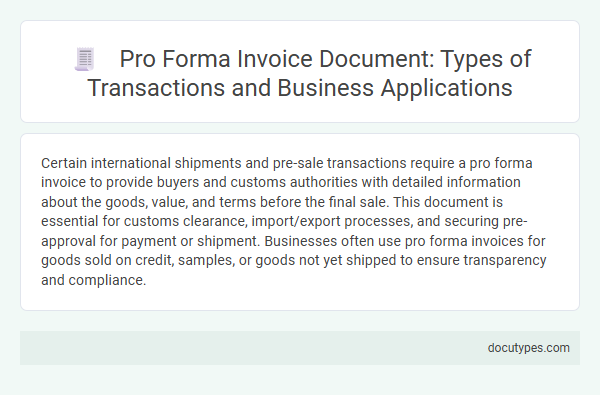Certain international shipments and pre-sale transactions require a pro forma invoice to provide buyers and customs authorities with detailed information about the goods, value, and terms before the final sale. This document is essential for customs clearance, import/export processes, and securing pre-approval for payment or shipment. Businesses often use pro forma invoices for goods sold on credit, samples, or goods not yet shipped to ensure transparency and compliance.
Introduction to Pro Forma Invoice Documents
A pro forma invoice serves as a preliminary bill of sale sent to buyers before the delivery of goods or services. It outlines the estimated costs and details to help facilitate international trade and customs clearance.
This document is commonly used in various transactions requiring clear cost expectations and legal documentation upfront.
- International Shipping - Provides customs authorities with an accurate declaration of goods' value to apply the correct duties and taxes.
- Advance Payments - Acts as a formal request for payment before goods or services are delivered to secure commitment from the buyer.
- Customs Clearance - Supports smooth import or export processes by offering a detailed description of the shipment's contents and value.
Key Features of a Pro Forma Invoice
A Pro Forma Invoice is essential for transactions involving customs clearance and international shipments. It provides a detailed estimate of the goods or services, including descriptions, quantities, and prices.
This document is key for pre-payment requests and budget approvals before the final sale. Your Pro Forma Invoice ensures clarity in financial expectations and helps prevent disputes during the transaction process.
Common Transactions Using Pro Forma Invoices
Which transactions require a pro forma invoice document? Pro forma invoices are commonly used in international trade to provide a detailed preliminary bill of sale. These invoices help buyers understand the cost and nature of the goods before finalizing the purchase.
What are common transactions using pro forma invoices? Pro forma invoices frequently appear in export shipments, customs declarations, and sales involving bespoke or custom-made products. They serve as a formal price quotation to facilitate buyer approval and payment arrangements.
Pro Forma Invoice vs. Commercial Invoice
Pro Forma Invoices are essential for specific transactions where no actual sale has occurred but a detailed estimation is needed. Understanding the difference between a Pro Forma Invoice and a Commercial Invoice helps clarify when each is required.
- Pro Forma Invoice Definition - A preliminary document provided before a sale, outlining estimated costs and terms to help importers or buyers make informed decisions.
- Commercial Invoice Purpose - An official document issued after a sale, used for customs clearance and payment processing, reflecting the actual transaction details.
- When Pro Forma is Required - You need a Pro Forma Invoice for customs declarations, price quotations, or to request payment before finalizing a sale.
Your transaction requirements determine whether a Pro Forma or Commercial Invoice is appropriate for accurate financial and legal processing.
Types of Businesses Relying on Pro Forma Invoices
Pro forma invoices are commonly required for international trade transactions, customs declarations, and pre-shipment quotations. Businesses engaged in exporting goods or services often rely on these documents to provide estimated costs before finalizing a sale.
Types of businesses relying on pro forma invoices include exporters, importers, and manufacturers who deal with cross-border shipments. Freight forwarders and customs brokers also use these invoices to facilitate the smooth clearance of goods through customs. Additionally, companies offering customized or made-to-order products depend on pro forma invoices to outline pricing and terms before production begins.
Applications in International Trade
Pro forma invoices are essential in international trade for preliminary transaction documentation. They outline the terms of sale prior to the shipment of goods or services.
- Customs Clearance - Used to declare the value of goods to customs for import/export duties and taxes.
- Trade Financing - Required by banks and financial institutions to process letters of credit or trade loans.
- Quotation and Contract Negotiation - Provides buyers with a clear statement of goods, prices, and delivery terms before finalizing contracts.
Benefits of Pro Forma Invoices for Buyers and Sellers
Pro forma invoices are essential for international trade transactions, customs clearance, and import-export documentation. They provide buyers with an accurate estimate of costs, including taxes and shipping fees, ensuring transparency before final purchase. Sellers benefit by setting clear payment expectations and reducing disputes during order processing.
Steps to Create a Pro Forma Invoice
A Pro Forma Invoice is required for transactions involving customs declarations, international shipments, or when a buyer requests a detailed cost estimate before finalizing the purchase. It serves as a preliminary bill of sale, outlining the goods, quantities, and agreed prices. Creating this document ensures clarity and smooth transaction processing.
To create a Pro Forma Invoice, start by listing the seller's and buyer's contact information, followed by a detailed description of the products or services. Include quantities, unit prices, total amounts, and terms of payment. Clearly mark the document as "Pro Forma Invoice" to distinguish it from a commercial invoice.
Your next step is to provide shipment details such as delivery terms, shipping method, and expected delivery date. Incorporate any additional costs like taxes or shipping fees if applicable. Review the document thoroughly to ensure accuracy before sending it to the buyer for confirmation.
Legal Considerations and Compliance
Pro forma invoices are essential for transactions involving customs clearance and international trade, serving as preliminary documents that outline the details of goods or services. Legal considerations require these invoices to accurately represent the transaction's value to comply with import-export regulations and avoid penalties.
Your business must ensure pro forma invoices meet jurisdiction-specific compliance standards, including correct product descriptions, quantities, and pricing. Failure to provide a compliant pro forma invoice can lead to shipment delays, fines, or disputes during the customs inspection process.
Which Transactions Require a Pro Forma Invoice Document? Infographic

